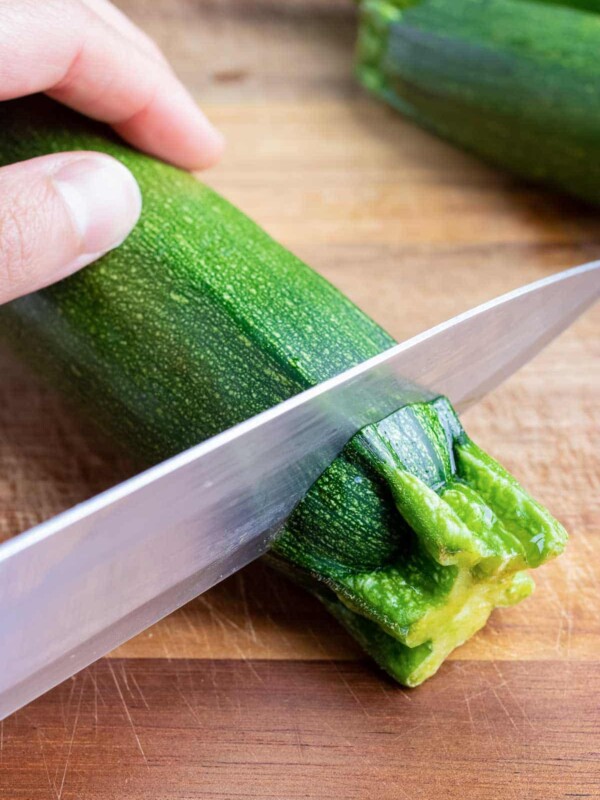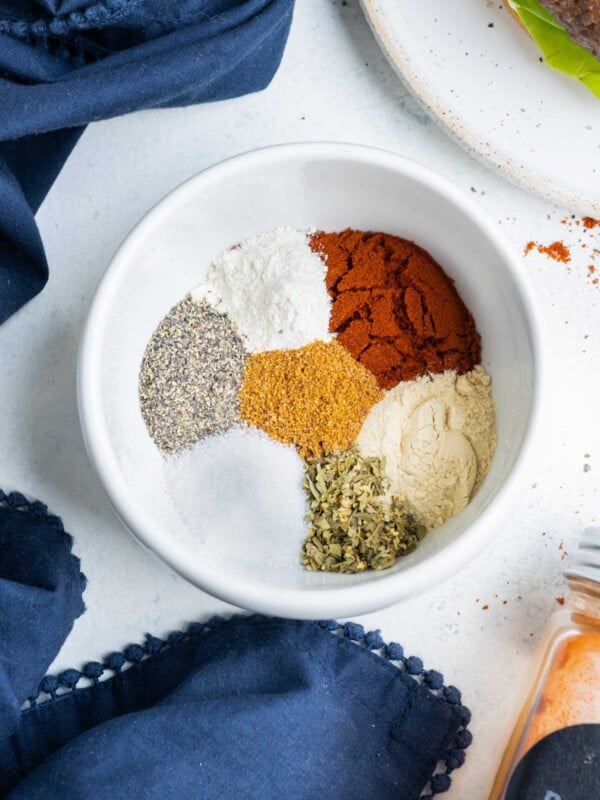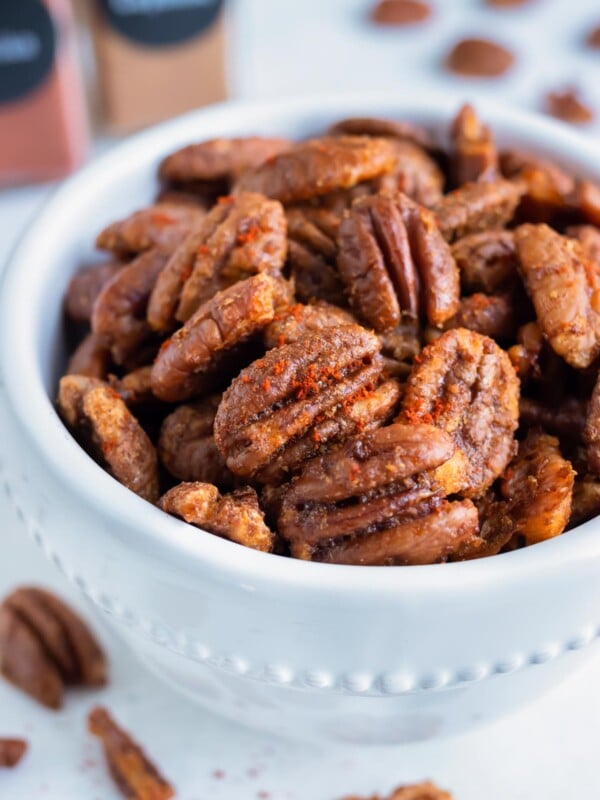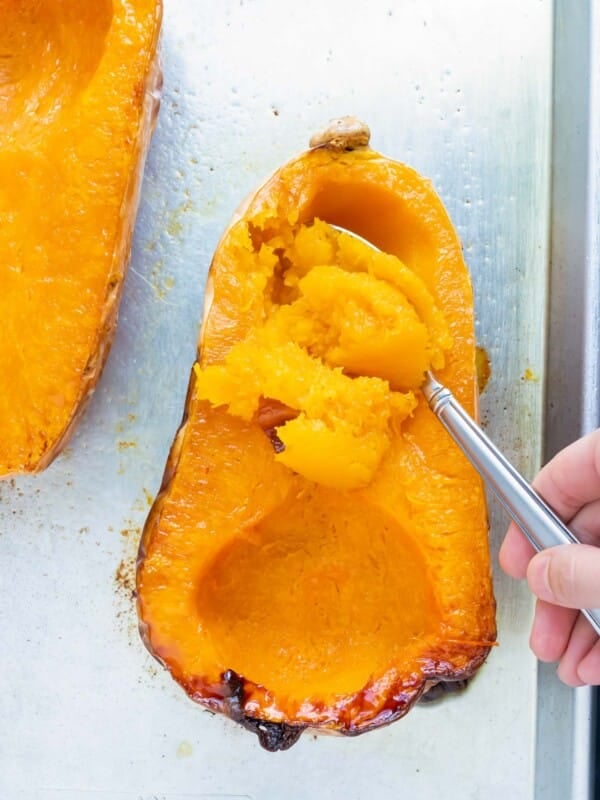What is zucchini?
Zucchini is technically a fruit that belongs in the Cucurbita pepo family. Other fruits in this family include summer squashes, winter squashes, cucumbers, and pumpkins. Zucchini is either dark, light, or white-spotted on the outside with white flesh and seeds on the inside. This fruit has a high water content, so it’s low in calories and sugar.
Zucchini is added to savory main dishes like Zucchini Lasagna. It’s also used as a side dish amongst other vegetables like Zucchini and Squash Casserole. Zucchini works wonderfully in baking recipes too, like Double Chocolate Zucchini Bread, Zucchini Banana Bread, and Zucchini Brownies.
What are the types of zucchini?
There are many different types of zucchini, and here a few common ones:
- Black Zucchini: dark green skin, white flesh (most common)
- Gold Rush: golden, almost yellow-squash skin
- Aristocrat: waxy skin and medium green outside layer
- Zucchini Gadzukes: dark green outside with distinct light green ridges

Nutrition Content of Zucchini
How many calories are in zucchini? Seven ounces of raw zucchini contain:
| Calories | 31 |
| Carbohydrates | 7 grams |
| Protein | 2 grams |
| Fat | 0.5 grams |
| Vitamin C | 33 milligrams |
| Vitamin B 6 | 0.5 milligrams |
| Manganese | 0.5 milligrams |
| Riboflavin | 0.5 milligrams |
| Potassium | 515 milligrams |
| Folate | 57 micrograms |
| Vitamin K | 8 micrograms |
| Vitamin A | 392 international units |
| Magnesium | 33 milligrams |
| Phosphorus | 75 milligrams |
| Thiamine | 0.1 milligram |
| Niacin | 1 milligram |
| Copper | 0.1 milligram |
Zucchini does contain vitamin E, choline, calcium, iron, zinc, and selenium, too. All together, it has a decent amount of vitamins and minerals, but it’s not as nutritionally dense as other vegetables like kale, broccoli, asparagus, or spinach.
19 Health Benefits of Zucchini
One of the many great things about the nutritional value in zucchini is that the vitamins and minerals it contains contribute to ample health benefits. Nutrients like vitamin C, lutein, and antioxidants contribute to many health benefits that effect your overall immune system. Let’s dig into these further.
Low-Calorie Food
Zucchini is full of water, so incorporating this non-starchy fruit in your diet naturally reduces your calorie intake, thus promoting possible weight loss. Zucchini can really help fill you up with other sources of protein since you can enjoy a lot of it at once. This is why many people replace pasta with “zoodles” or zucchini noodles like in this Zucchini Noodles with Pesto.
Skin
Eating enough zucchini can help keep your skin feeling youthful. Zucchini has photoprotective properties that can help protect your skin from UV damage. It can also reduce signs of aging through preventing free radicals that damage the elasticity in your skin.
Additionally, zucchini reduces inflammation responses in your skin. How? When your skin is exposed to the sun, the lutein in the zucchini reduces the impact of inflammation from sunburns, resulting in well-hydrated skin.
Reduces Risk of Cancer
The high fiber content in zucchini can help reduce the risk of different types of cancer, like colon cancer and colorectal cancer. Fiber-rich foods help absorb excess water in the color, retain moisture in stools, and helps them exit smoothly out of your body.
The vitamin C and lutein in zucchini also help reduce oxidative DNA damage and decrease the growth of prostate cancer cells in the prostate gland.
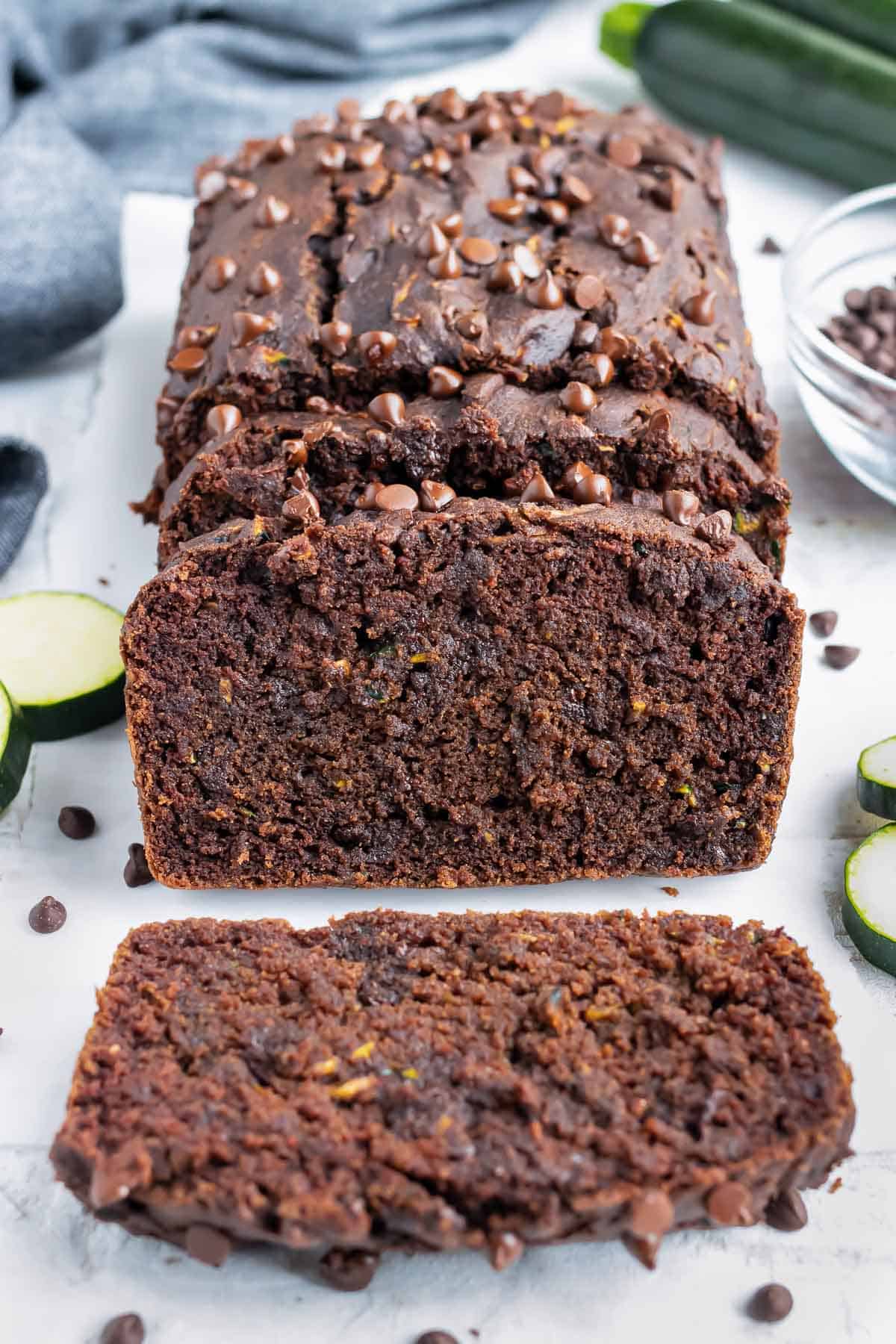
Eye Health
Lutein and zeaxanthin found in zucchini are full of antioxidants that protect the retina, cornea, and macula from UV light damage, vision loss, and blindness. Preventing these kinds of damage to your eyes can reduce the risk of macular degeneration, cataracts, and glaucoma.
Anti-Inflammatory
Eating zucchini can naturally reduce inflammation in your heart, skin, and even lower your cholesterol levels. Zucchini offers anti-inflammatory protection in your gut that can reduce IBS, ulcers, and even leaky gut syndrome. These benefits are thanks to the zeaxanthin, lutein, and polyphenols present in zucchini.
Teeth & Bone Health
Incorporating zucchini in your diet more often will keep your bones and teeth strong because of the lutein, vitamin K, and zeaxanthin it contains. Additionally, the magnesium in zucchini helps build strong bones and improves muscle contraction, along with calcium. The folate in this fruit protects your bones and paired with vitamin A, assist in healthy bone growth.
These vitamins and minerals can prevent bone fractures and osteoporosis. They also provide a higher bone density throughout your life.
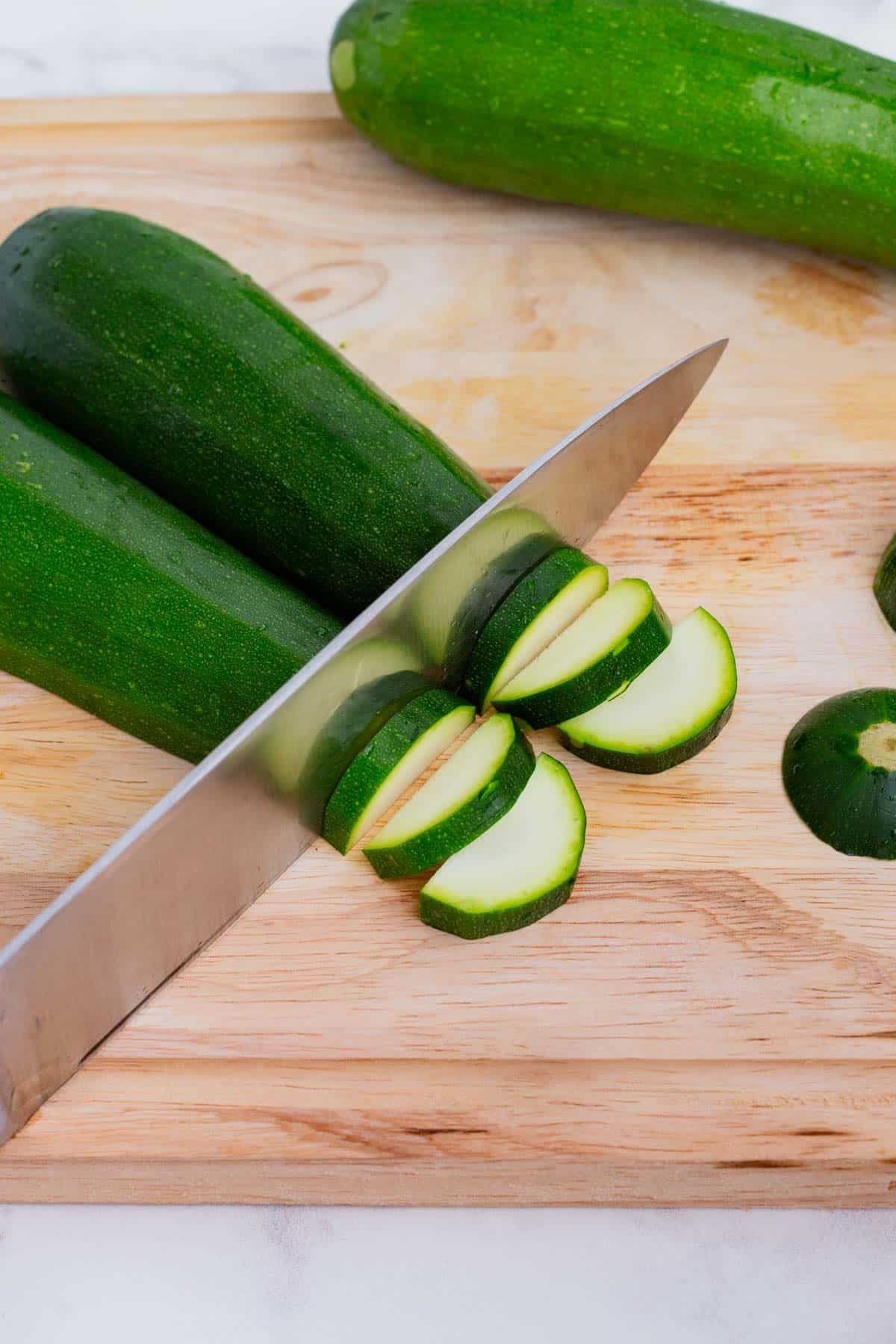
Vitamin C
Did you know that one medium zucchini (about 7 ounces) has over 50% of your recommended daily vitamin C intake? With this much vitamin C, it isn’t hard to incorporate other vegetables and fruits to get enough of this nutrient to maintain the lining in your blood cells, lower blood pressure, and protect your arteries.
The vitamin C in zucchini has other benefits, especially for the development in infants. For example, vitamin C can help reduce brain development deficiencies. It can also prevent lung issues in babies once they are born.
Antioxidants
Don’t peel your zucchini—the skin is full of antioxidants like vitamin A, superoxide dismutase, glucose-6-phosphatase, and glutathione peroxidase. These antioxidants in the skin of zucchini fight inflammation, reduce oxidative stress, defend vision, promote heart health, and improve digestion. They also fight against cancers in the esophagus, stomach, and mouth.
Potassium
If you are low in potassium, then zucchini can be a great way to start fixing that. Potassium may be a natural way to lower blood pressure because it counteracts high-sodium diets. That’s why eating zucchini to increase your potassium intake can help reduce the risk of stroke and heart disease.
Potassium balances out the sodium in your body, which is extremely important and can improve mental, hormonal, and gut health.
Digestion / Gut Health
Zucchini provides essential electrolytes and nutrients that can assist in dehydrated digestive issues. Eating raw, non-starchy vegetables and fruit like zucchini help overall healthy digestion and are easy on your gut.
Like mentioned previously, the large water content in zucchini offers great dietary fiber that can be a natural constipation relief and help treat diarrhea.
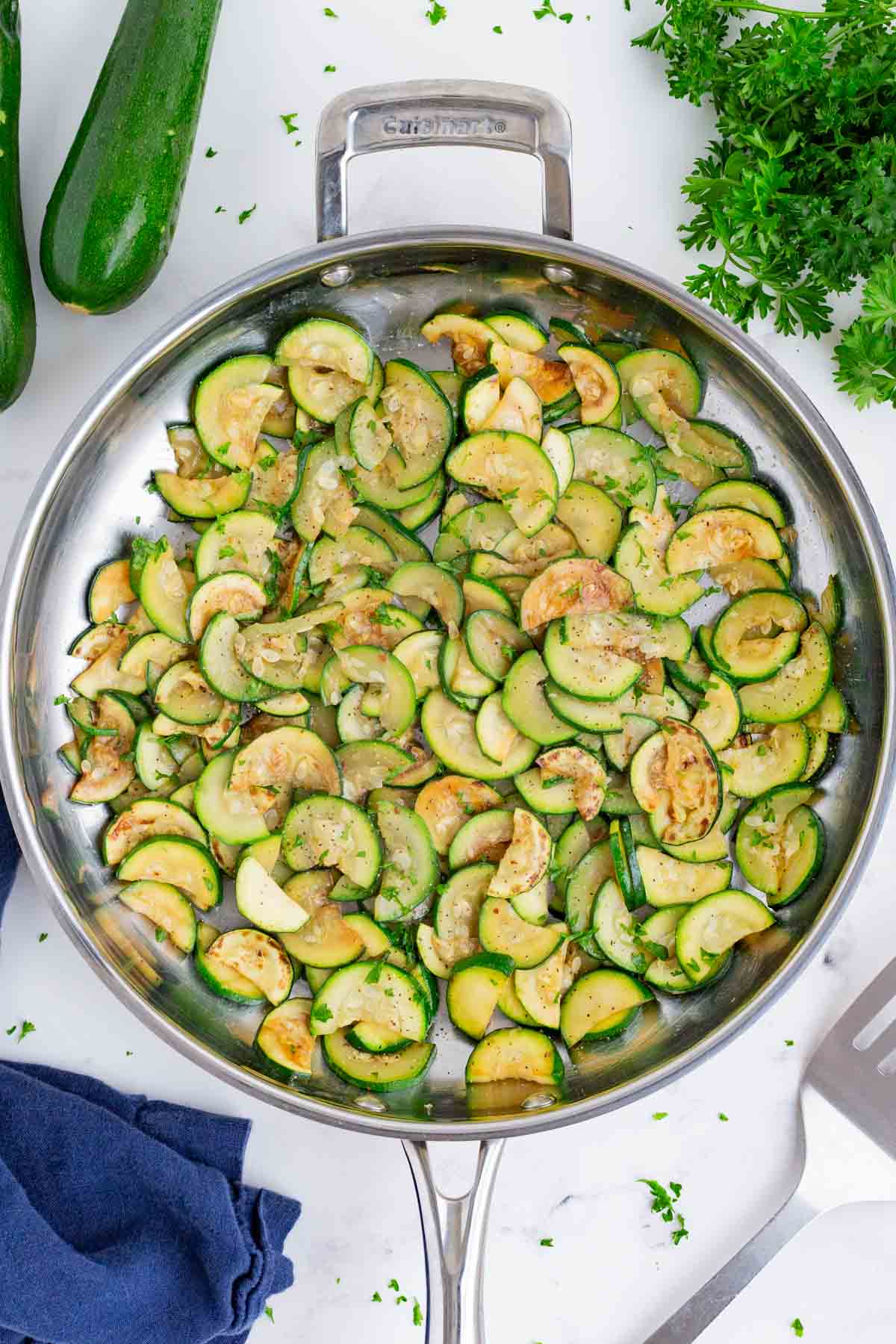
Hormone Balance / Thyroid & Adrenal
Eating enough zucchini can help your thyroid, adrenal, and insulin regulation. The balance of manganese, potassium, and sodium in your body are crucial to your thyroid and adrenal gland’s health. If imbalanced, your body can be more susceptible to depression, anxiety, and autoimmune diseases like Addison’s disease and hypothyroidism.
B Vitamins
Zucchini is rich in B vitamins like vitamin B6, folate, and riboflavin that support a healthy metabolism. These B vitamins aid in cognitive health, reduced fatigue, and assisting in mental health. More specifically, folate is tied to cell growth and tissue development/maintenance.
Diabetes Regulation
By learning the nutritional value in foods like zucchini, you can naturally decrease the development of type II diabetes and prediabetes. The lack of carbohydrates and sugar makes zucchini a nutrient-dense food that can prevent diabetes. This fruit can help control blood sugar levels due to its low-glycemic index, which can prevent insulin spikes and dips.
By simply eating a high fiber diet of more than 30 grams a day, you may be able to prevent prediabetes. That kind of blood sugar control positively impacts your overall wellbeing and can really assist in a comfortable, healthy lifestyle.
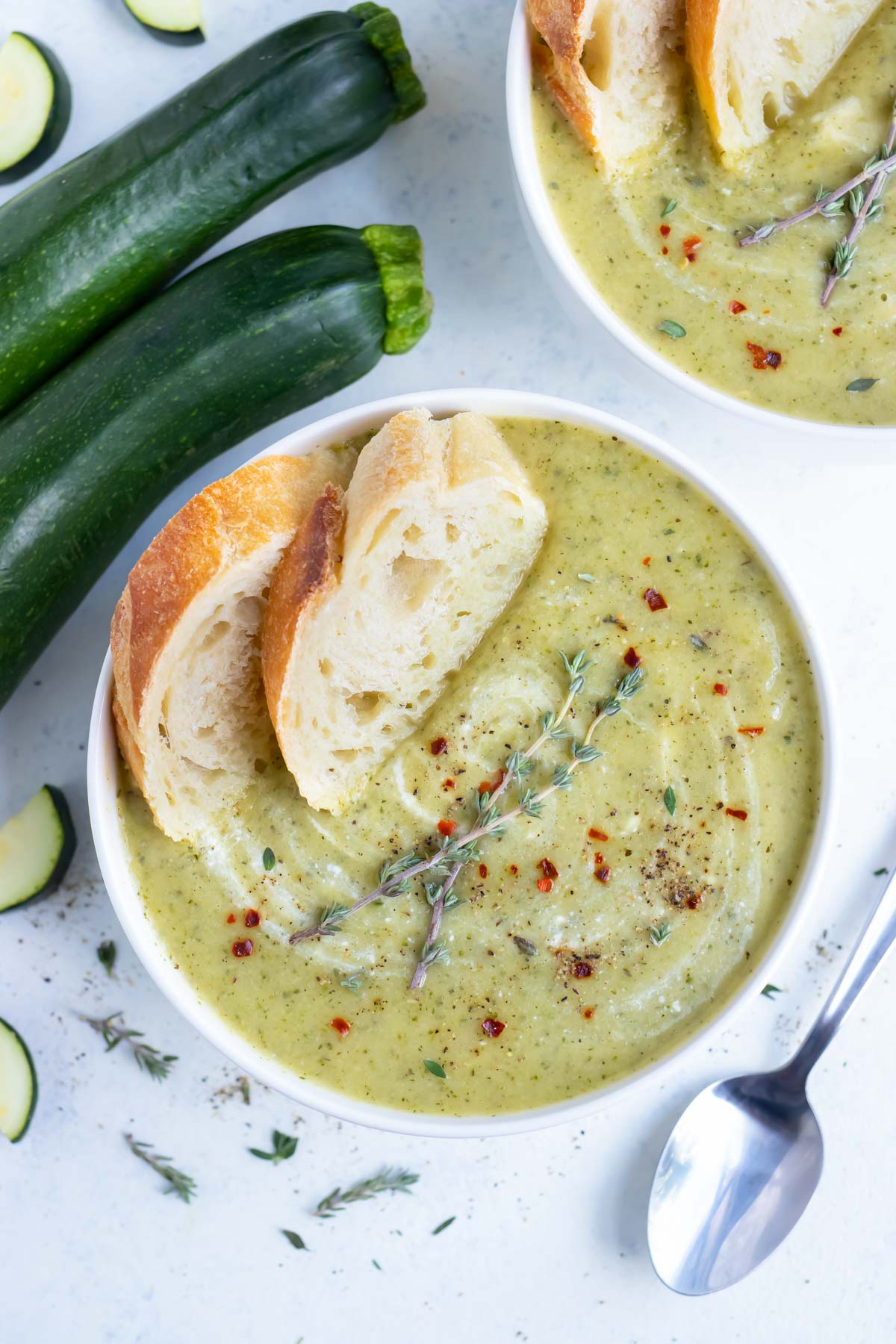
Heart Health
Incorporating zucchini into your everyday diet can assist in a happy, healthy heart. It reduces the chances of obesity when paired with the proper amount of protein, carbohydrates, and fats.
Eating zucchini fresh, cooked, or in a baked good adds variety of this heart-healthy fruit to your diet that can reduce issues like high blood pressure. Eating more of this fruit can support weight loss, positively impact insulin, and promote stable hormone levels.
Asthma Cure
The anti-inflammatory properties that zucchini contains contribute to asthma treatment. Vitamin C and copper are what can effectively treat this health issue. Additionally, eating zucchini can mitigate asthma attacks and bronchial hypersensitivity.
Lowers Blood Pressure
Because zucchini is so rich in potassium, it can assist in lowering blood pressure. The potassium in zucchini affects the blood vessels in your body which is linked to your blood pressure. Potassium counters negative effects of sodium, which can cause an unhealthy increased heart rate.
Eating zucchini can regulate the proper balance of sodium to potassium. In general, you’re looking for a 2:1 ratio over the course of the day between potassium and sodium. Foods that aren’t the best for our bodies can throw off that balance, and that’s where foods high in potassium assist in maintaining a healthy equilibrium.
Pregnancy Health
If you’re wanting to conceive or are a pregnant women, eating zucchini that is rich in folate is extremely beneficial for you and the baby. Folate allows your body to synthesize new DNA and can prevent birth defects and developmental problems. Zucchini also can maintain energy levels and mood when you are pregnant.

Collagen Aid
If you want to increase the maturation of collagen in your skin, hair, and nails, eat a zucchini! The riboflavin in zucchini is what aids in collagen production. On top of that, vitamin C assists the riboflavin in collagen synthesis which can help maintain joint, cartilage, and blood vessel health.
Brain Health
The riboflavin that is in zucchini can prevent age-related memory loss and other like conditions like Alzheimer’s disease. The high-water content that zucchini has will assist your brain (that’s 75% water) think quickly, stay focused longer, and improve creativity. The folate in zucchini can help improve anemia, which causes weakness and fatigue.
How to Incorporate Zucchini in Your Diet
Raw
Cut your zucchini in long, stick forms and eat them with your favorite dip. You can use this Best Ranch Dressing, Easy Homemade Hummus, or toss them in your favorite Balsamic Vinaigrette Dressing. Or, add it to a side salad for a quick snack like our Thai Zucchini Noodle Salad with Cabbage.
Blend
Cook your zucchini down, then add it blended to your favorite pasta sauce like our Easy Pasta Primavera Recipe, Creamy Zucchini Soup, or even add it to this Spinach Fruit Smoothie.
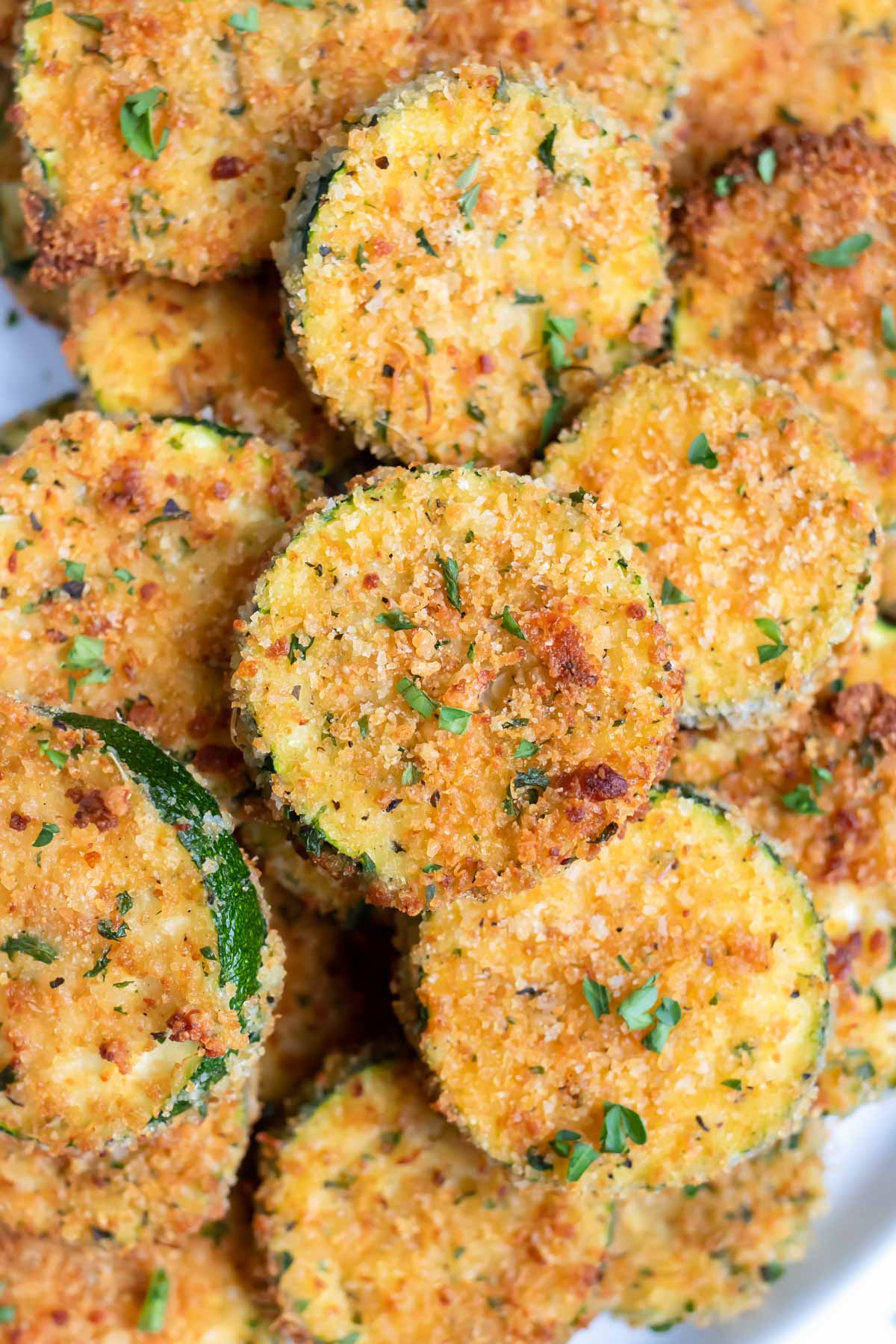
Sautéed
Drizzle your cut zucchini with some olive oil, salt, and pepper and add it to your skillet for just a few minutes, just like in this Simple Sautéed Zucchini and Yellow Squash. You can add as many spices you’d like, and eat it as a side when you barbeque or for a quiet night in.
Swap
Instead of using pasta noodles, spiral or shred your zucchini for your pasta dishes for a low-carb alternative. It’s easy when you know How To Make Zucchini Noodles or Fresh Tomato Basil Zucchini Noodles. You can also cut it in thin strips to replace lasagna pasta like in these Easy Zucchini Lasagna Roll-Ups.
Baked Goods
Shred your zucchini and add it to Healthy Lemon Zucchini Bread, Double Chocolate Zucchini Bread, Healthy Lemon Zucchini Muffins, cookies, and even Zucchini Brownies for a set of decadent treats that also pack a nutritious punch!
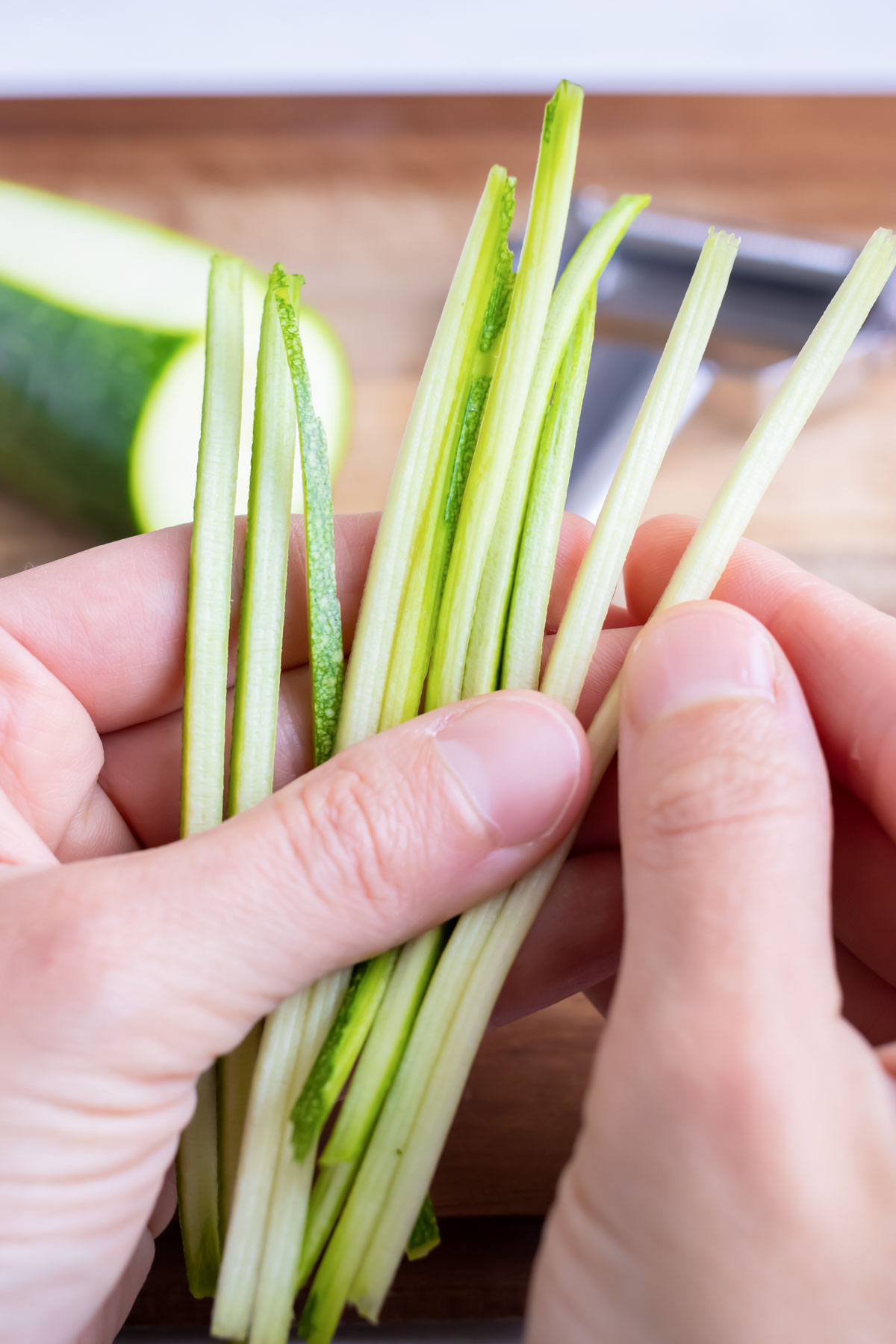
Veggie Hash
Whether it’s for breakfast, a salad, or dinner, chopping up zucchini is an easy way to add nutrients to any dish. Use this Air Fryer Zucchini Recipe and add it to Breakfast Egg Muffin Cups or Sweet Potato Hash.
Baby Food
Purée zucchini by peeling it, cooking it, blending it, and adding it to a baby food container. It takes less than 20 minutes, and you’ll have easy access to a quick snack for your baby.
How is zucchini used in medicine?
Zucchini has been used to treat colds, reduce and relive aches, and improve recovery time because of its antioxidant, anti-inflammatory, and antiviral properties.
Doctors might suggest that you eat more zucchini if you are experiencing bloating, constipation, acid reflux, or an unsettled stomach.
Some doctors recommend eating zucchini especially in the hot summer months because they aid in dehydration and not as often in the cold months because it can lead to improper digestion and too much water in your body.

Who shouldn’t eat zucchini?
While zucchini has many health benefits, there are some risks if you eat too much of it when you are experiencing certain health issues.
Low Fiber Diet
If you have been recommended to eat a low fiber diet, eating raw vegetables and fruits will be more harmful than helpful for you. A low fiber diet reduces the amount of undigested food moving through your bowels. So, eating too many raw vegetables and fruits could cause diarrhea, cramping, and even IBS.
Low Cholesterol
If you already have low cholesterol, eating zucchini won’t make a big difference to you. The heart health properties that zucchini has already lower high cholesterol. This means that it’s not necessary to eat more foods that do things for you that your body already has covered.
Allergies
You’ll know if you’re allergic to zucchini when you are nauseous, have severe itching in your throat and on your skin, and rashes or hives. Definitely do not continue to eat zucchini if this happens to you.
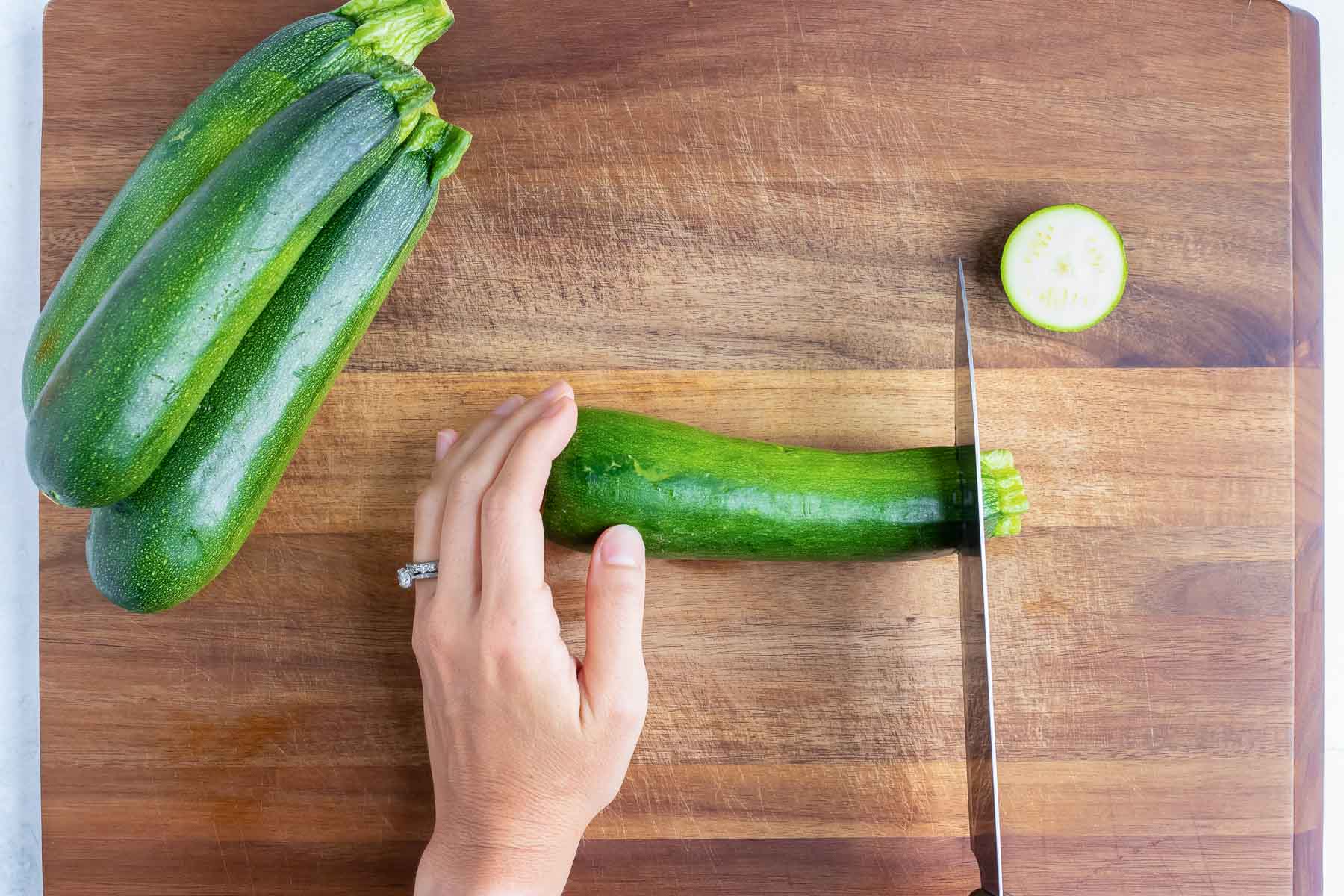
How to Pick Zucchini
When shopping at grocery stores, you want to select a zucchini that is clean, and blemish-free. A ripe zucchini will have tender skin, and you’ll be able to pierce it with your fingernail.
How to Store Zucchini
If you’re going to eat your zucchini within a matter of days, store it in your fridge. Don’t forget to wrap it tightly in plastic wrap or with the plastic bag you used to pick it at the store. If you want to freeze zucchini, follow these steps (for more details, check out this How to Freeze Zucchini post):
- Slice your zucchini into chunks
- Steam them for 3 minutes
- Dry completely
- Place in freezer-safe container
OR
- Shred your zucchini
- Place directly in freezer-safe container
Fun Facts about Zucchini
Zucchini are such a versatile fruit (yep, they’re actually a fruit!), that it pays to know as much as you can about them. Here are some factoids to get your wheels turning:
- ONE zucchini is actually called zucchina.
- The largest zucchini weighed close to 67 pounds.
- Zucchini is the only fruit that starts with a Z.
- Zucchini flowers are edible and can be fried or even used for garnishes on cakes.
- Flavorful zucchini are smaller and darker.
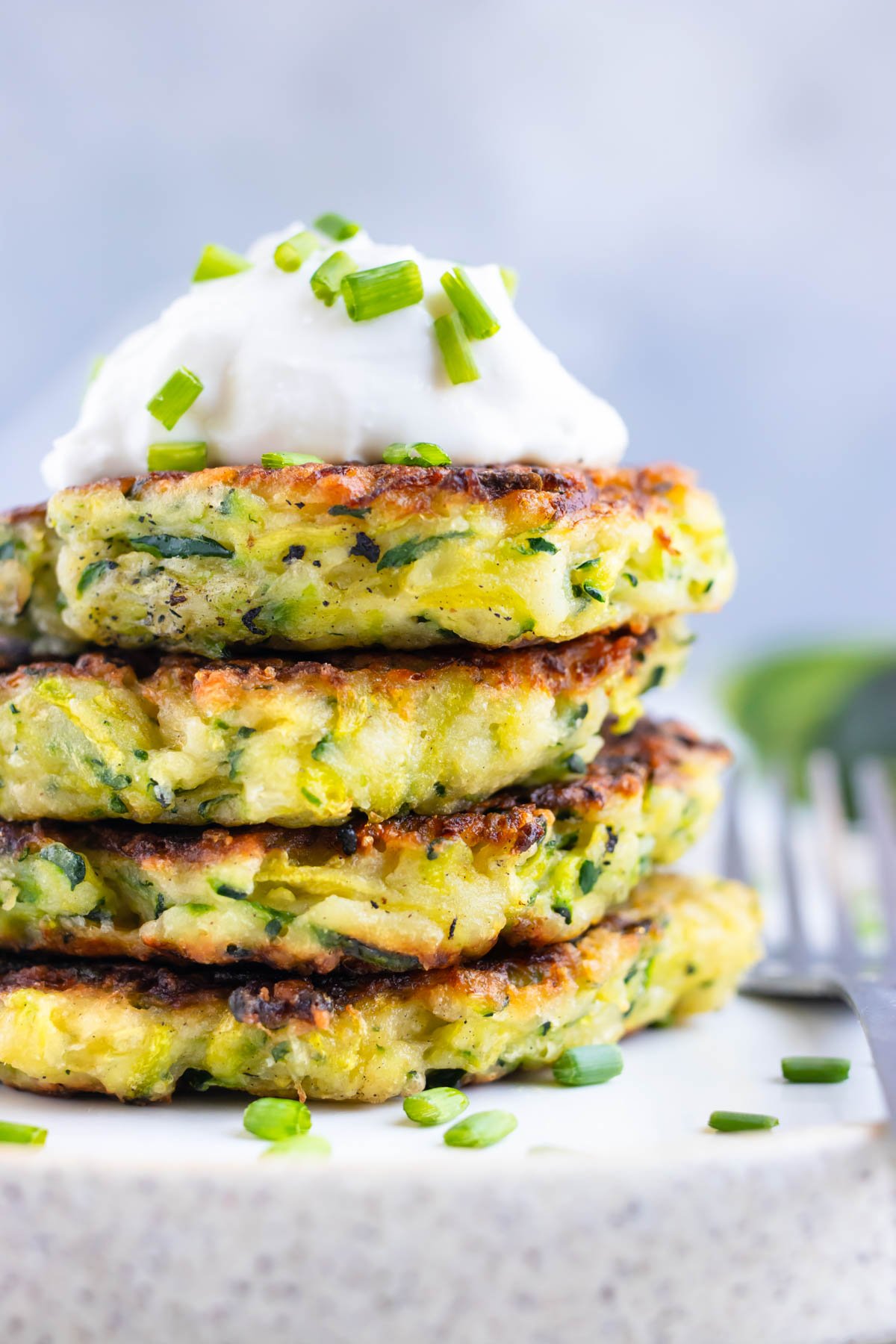
The Best Zucchini Recipes
With all the health benefits they have, zucchinis make for great additions to any menu. You have to try your hand at some of these recipes:

